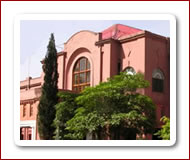Introduction
 Botany is a broad, multidisciplinary subject with inputs from most other areas of science and technology. Research areas include the study of plant structure, growth and differentiation, reproduction, biochemistry and primary metabolism, chemical products, development, diseases, evolutionary relationships, systematics, and plant taxonomy. Botanical research has diverse applications in providing staple foods, materials such as timber, oil, rubber, fiber and drugs, in modern horticulture, agriculture and forestry, plant propagation, breeding and genetic modification, in the synthesis of chemicals and raw materials for construction and energy production, in environmental management, and the maintenance of biodiversity. Botany is a broad, multidisciplinary subject with inputs from most other areas of science and technology. Research areas include the study of plant structure, growth and differentiation, reproduction, biochemistry and primary metabolism, chemical products, development, diseases, evolutionary relationships, systematics, and plant taxonomy. Botanical research has diverse applications in providing staple foods, materials such as timber, oil, rubber, fiber and drugs, in modern horticulture, agriculture and forestry, plant propagation, breeding and genetic modification, in the synthesis of chemicals and raw materials for construction and energy production, in environmental management, and the maintenance of biodiversity.
 The Scope of Botany deals with the utility of plants in relation to mankind. The course contents of Botany is so vast that the number of branches covering it is on the increase. Branches like morphology, anatomy, histology and cytology give us an idea about what plants are, and to what extent they are diverse. The scope of Botany also includes the benefits derived from the plant world. The entire living world, right from microscopic life to higher vertebrates, is directly or indirectly dependent on plants. Botany, along with its allied branches, provides employment opportunities. It is a prerequisite for studying medicine or pharmacy. There is also enormous employment scope in academics, agriculture, horticulture, forestry, etc. Botany is a key discipline in the universities to achieve sustainable development. The graduates will have different options for going into M. Phil and Ph. D. studies, be employed in different schools, colleges, various public and private departments/organizations like, Wildlife, Forestry adopting their own entrepreneurship and create further employment opportunities.Specifically, a graduate of the proposed programme is expected to have the broadened and consolidated basic and applied botanical knowledge in both theory and practical, deepened and consolidated research based knowledge in selected areas, enhanced competence in designing and managing experiments and implementing projects. The Scope of Botany deals with the utility of plants in relation to mankind. The course contents of Botany is so vast that the number of branches covering it is on the increase. Branches like morphology, anatomy, histology and cytology give us an idea about what plants are, and to what extent they are diverse. The scope of Botany also includes the benefits derived from the plant world. The entire living world, right from microscopic life to higher vertebrates, is directly or indirectly dependent on plants. Botany, along with its allied branches, provides employment opportunities. It is a prerequisite for studying medicine or pharmacy. There is also enormous employment scope in academics, agriculture, horticulture, forestry, etc. Botany is a key discipline in the universities to achieve sustainable development. The graduates will have different options for going into M. Phil and Ph. D. studies, be employed in different schools, colleges, various public and private departments/organizations like, Wildlife, Forestry adopting their own entrepreneurship and create further employment opportunities.Specifically, a graduate of the proposed programme is expected to have the broadened and consolidated basic and applied botanical knowledge in both theory and practical, deepened and consolidated research based knowledge in selected areas, enhanced competence in designing and managing experiments and implementing projects.
|
